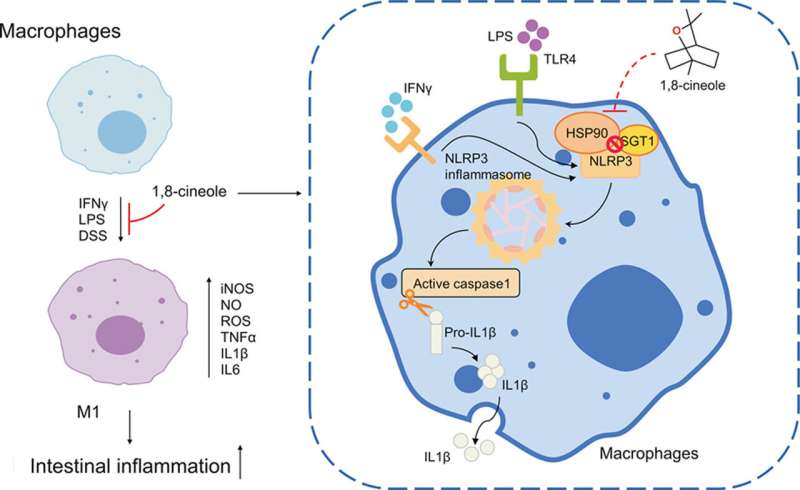This article has been reviewed according to Science X's editorial process and policies. Editors have highlighted the following attributes while ensuring the content's credibility:
fact-checked
proofread
Research demonstrates the potential of natural compounds to treat gastrointestinal disorders

Chronic gastrointestinal (GI) disorders are becoming increasingly common throughout the world, but many of them still lack effective treatment. Researchers have now turned to natural compounds, such as those present in traditional medicines, to search for potential drug candidates for difficult-to-treat diseases. The latest issue of the Journal of Pharmaceutical Analysis (JPA) features three articles that report promising findings and could pave the way to treatments for complex diseases affecting the liver and intestine.
The first study focuses on 1,8-cineole, a compound found in volatile oil extracts of the Amomum compactum plant, for treating ulcerative colitis (UC). Motivated by its established use for the treatment of pneumonia and preliminary data on its beneficial effects on the gut, a group of researchers investigated the anti-inflammatory mechanisms of this compound in the context of UC. To this end, they employed dextran sulfate sodium to induce colitis in C57BL/6 mice and conducted several assays on cell cultures to determine 1,8-cineole's targets and its effects.
The article was published in JPA in September 2023. The findings revealed that this molecule inhibits the binding between heat shock protein 90 (HSP90) and nucleotide-binding and oligomerization domain-, leucine rich repeat-, and pyrin domain-containing 3 (NLRP3), thereby inhibiting the activation of the NLPR3 inflammasome and the M1 polarization of macrophages. This prevents the activation of inflammatory pathways and promotes the recovery of the intestinal wall.
"Our findings provide convincing evidence that 1,8-cineole is a promising candidate in the search for a novel therapeutic strategy for UC treatment," comments corresponding author Dr. Xiaoyin Chen.
In the second study, scientists turned to ginsenoside Rk2, a bioactive component found in steamed ginseng (Panax notoginseng), and investigated its potential as a treatment for alcoholic lived disease (ALD). They used an ethanol feeding regime to induce ALD-like liver injury in mice and then showed that Rk2 could alleviate the observed deleterious effects.
Simply put, as an NLPR3 inhibitor, Rk2 could ameliorate liver inflammation. Moreover, Rk2 also restored intestinal barrier function by enhancing NLPR6 signaling in the intestine, demonstrating the multifaceted nature of its therapeutic potential.
"Our findings indicate that Rk2 is a promising agent for the prevention and treatment of ALD and other NLPR3-driven diseases," concludes corresponding author Dr. Jian-Bo Wan.
Finally, in the third study, researchers explored the relationship between gut microbiota and specnuezhenide (SNZ), an active component of the traditional Chinese medicine Fructus Ligustri Lucidi. Their findings revealed that SNZ is metabolized by the enzyme carboxylesterase produced by intestinal bacteria, yielding the metabolites salidroside and tyrosol.
In mice, orally administered SNZ could modify the makeup of the gut microbiota and fungal groups, and also had the potential to inhibit colorectal tumor growth. Taken together, these results suggest the importance of the metabolism of gut microbiota.
"Intestinal bacterial metabolic enzymes are an important supplement to human liver and kidney metabolism. Thus, in clinical drug use, the characteristics of the gut microbiota in individuals must be taken into account for personalized treatment," remarks corresponding author Dr. Yan Wang.
These studies will hopefully pave the way to naturally effective treatments for challenging GI disorders.
More information: Shengsuo Ma et al, 1,8-cineole ameliorates colon injury by downregulating macrophage M1 polarization via inhibiting the HSP90-NLRP3-SGT1 complex, Journal of Pharmaceutical Analysis (2023). DOI: 10.1016/j.jpha.2023.07.001
Jian Zou et al, Ginsenoside Rk2, a dehydroprotopanaxadiol saponin, alleviates alcoholic liver disease via regulating NLRP3 and NLRP6 inflammasome signaling pathways in mice, Journal of Pharmaceutical Analysis (2023). DOI: 10.1016/j.jpha.2023.05.005
Hang Yu et al, Gut microbiota-based pharmacokinetic-pharmacodynamic study and molecular mechanism of specnuezhenide in the treatment of colorectal cancer targeting carboxylesterase, Journal of Pharmaceutical Analysis (2023). DOI: 10.1016/j.jpha.2023.06.012




















